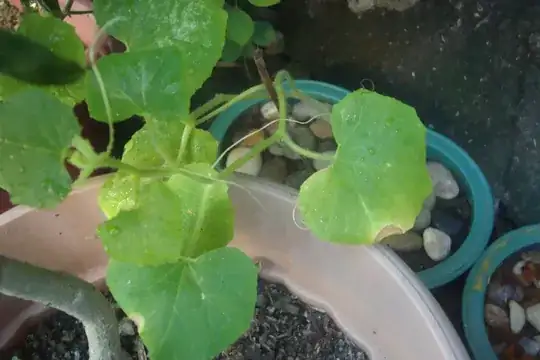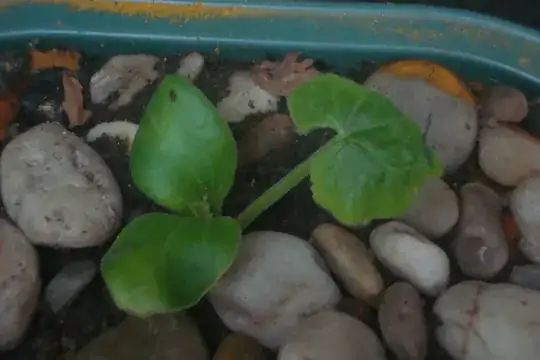I have planted zucchini and honey dew melon and I was happy that they are growing healthy but after a few days I notice the yellow spots with brown center appeared in the leaves of my honey dew melon and my zucchini looks like it starts to die. Here are the pictures of the two plants:
1 Answers
It looks like they need more light and maybe also nutrients (probably potassium, since the leaf edges are yellowing first, and since the plants look kind of weak). More light should make them stronger, though. If these are indoors, or in low-light, a fungal infection is also possible, especially if they don't have enough potassium. If they already have enough nitrogen, adding nitrogen with the potassium could be a bad idea (since it might not change anything, as nitrogen and potassium need to be in balance).
It looks like the melon has spider mite and/or anthracnose damage. It could be something else, like scale, though, but it looks like spider mite damage to me (on the top leaf in the top picture).
It's more ideal to grow these types of plants in the ground (or at least outside in much larger containers). People usually direct-seed them in the ground if they can. I'm not sure when your season starts, though.
For indoor plants, you might try neem oil to get rid of spider mites. I've heard that can work. I think sea minerals would clear up the fungus, if it has a fungus (that's my experience with probably the same issue, but on a pepper plant; there may be fungicides that would work, though, but maybe not if it's anthracnose). Potassium sulfate would probably help nutrient-wise. A little wood ash might work for potassium, if you've got some handy. Wood ash would raise the soil pH, but I think cucurbits handle that better than a lot of plants (and they look like they might need the calcium wood ash provides).
Wood ash aside, all that can get kind of expensive for a couple plants, though. If you can plant outside, I'd probably either just transplant them into the ground and/or plant new plants directly outside from seed. In future, you might consider starting plants in such as a Strong Camel greenhouse before transplanting (that's what I did, this year; cucurbits don't normally need to grow very long before you transplant them, though), or start them indoor under grow lights (or at least on the sill of a south window without anything blocking the light). If you're not in the northern hemisphere, a south window might not be what you want. If you used grow lights, it would probably be easier to start with new seeds, since they can beat out the growth of older plants, if they have bright, close light while young. Of course, they might suffer from the same problems again, if precautions aren't taken (but more light and potassium should help, in large part).
You can potentially have good results with muskmelons started extra early indoors. I've done that before. I haven't had the same experience with squash, however (except for Shark Fin Melon squash, which is probably fine whether you direct-seed it or not).
- 17,794
- 4
- 27
- 65
-
We don't have ground to be planted because they cemented all of it.Thus the ready made potting mix in stores can be sufficient enough to compensate the lack of nutrients of my zucchini plant. Are there any alternative natural pesticides that I can use for my honey dew melon? – SilverRay Sep 03 '16 at 00:18
-
That's no fun. Is it outdoors or indoors, currently? How much and what kind of light is it getting? Others might have more tips on pesticides. I would mostly recommend focusing on getting the plants strong, personally. To me it looks like it needs more light and potassium. I could be wrong, but that's how it looks. What's your weather like? That affects which nutrients are available. For a pesticide, neem oil could work outside, too, but I wouldn't use it after the plants bloom, since it can harm bees (or all insects.) – Brōtsyorfuzthrāx Sep 03 '16 at 01:53
-
In the long run, you'll need at least a five gallon container per plant (ideally more). A 10-20+ gallon moving tote may work well. Cucurbits generally don't like to be transplanted (so, it might be best to make their final container their first, or at least their second, container). Although cucurbits can be grown just fine in containers, you might be interested to know that some other kinds of plants may be a lot easier to do that way (with less soil than cucurbits need, too). Peppers and dwarf tomatoes generally work well. If light is low, you might try such as Grandpa's Home peppers. – Brōtsyorfuzthrāx Sep 03 '16 at 02:06
-
Cucumbers should be easier in containers than melons and squash, also, although they are cucurbits. I don't know how well it works with potting soil (I use our clay loam soil with peat moss and rockdust mixed in), but I like to put two pepper plants in one 10-gallon moving tote, and that works out pretty well. I did need to give them some extra zinc for some reason, though. – Brōtsyorfuzthrāx Sep 03 '16 at 02:09
-
Potting soil is usually high in nitrogen, which can be great, but not necessarily with young plants (especially if they don't get enough light). If this is the case, extra potassium should help with your problems. Potting soil doesn't seem to work well on its own in my area, probably due to the strong sun here, but people in other areas report excellent results with it (at least for tomatoes). In my area, they need extra minerals and nutrients in the potting soil for some reason. So, that's why I use our topsoil mixed with peat moss. Your plants don't look like potting soil plants here, though – Brōtsyorfuzthrāx Sep 03 '16 at 02:22
-
I used only natural soil and I can only plant in pots for their is no available ground to be planted. Is planting them in larger containers may resolve or somehow ease their situations? – SilverRay Sep 03 '16 at 02:31
-
I don't know how large your containers are; so, it's difficult to say. However, unless the containers are very small, they're probably not what has caused the current issues, because the plants are young, and young plants don't tend to use a lot of nutrients. Large enough containers would definitely be important later on, though. When plants get bigger, they generally need a lot more nutrients. – Brōtsyorfuzthrāx Sep 04 '16 at 04:06
-
1Thanks for the answers. Last few days a worm started to be home in my plants and it solved the nutrient deficiency in my plants and now they are becoming healthy. – SilverRay Sep 16 '16 at 01:07

